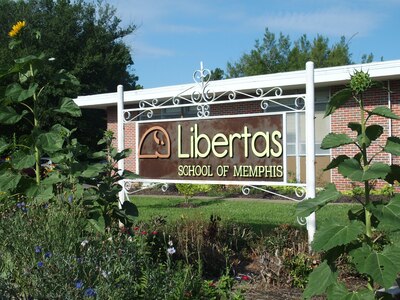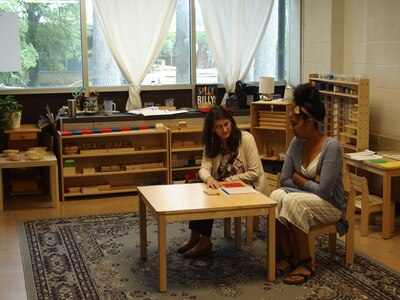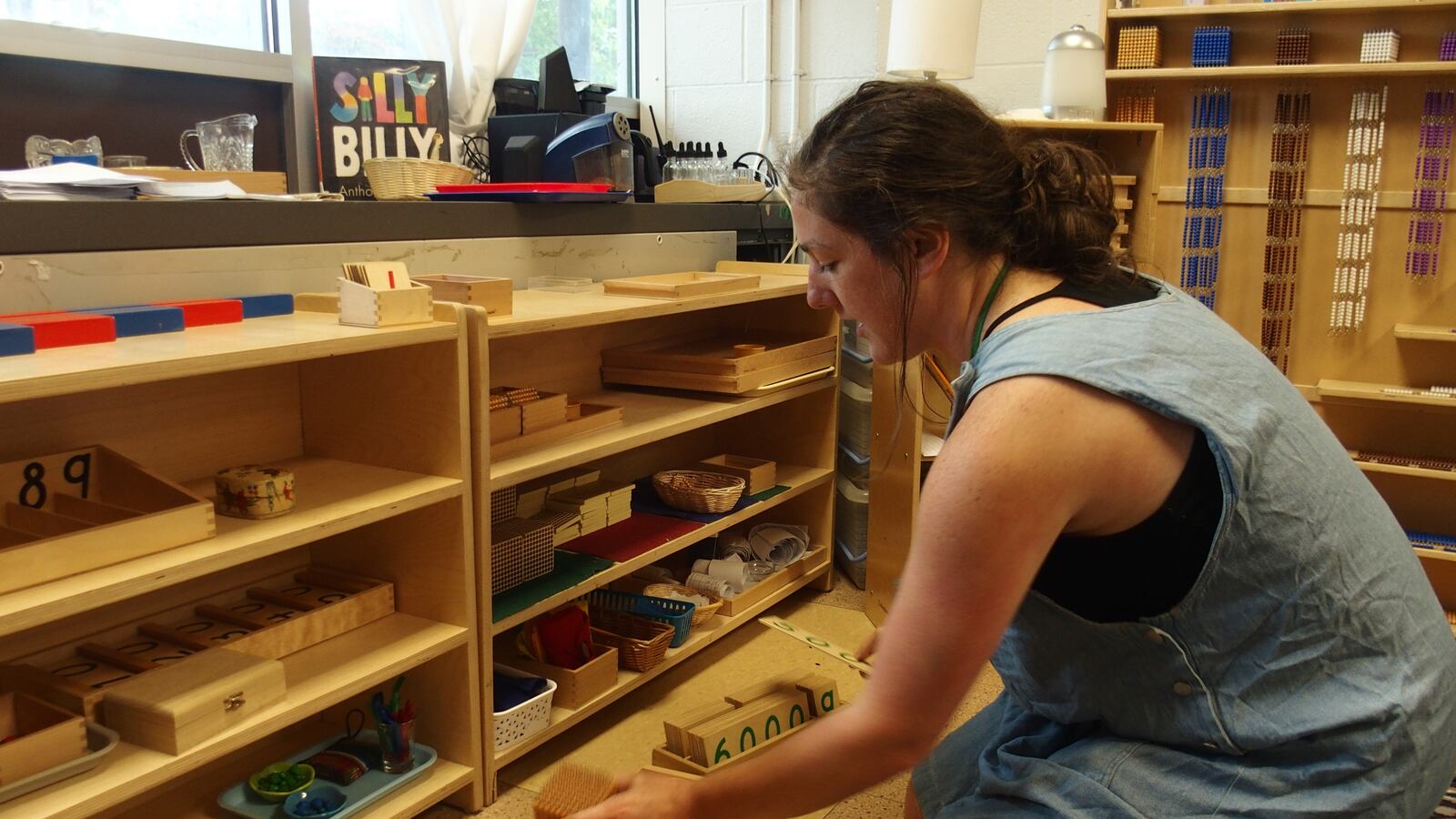Tori Long hated math as a kid.
“I was always just shown examples on the board of what to do. It never made sense to me,” the special education teacher said Thursday. She was kneeling on the linoleum tile, demonstrating how to use the sensory learning materials stocked in the classrooms at Libertas School of Memphis.
Long is spending the first month of her summer at a teacher-training program hosted by Libertas, the only Montessori school in the Achievement School District, whose schools are run by private operators. Schools in this district, which rank in the state’s lowest 5% academically, are placed on the state’s so-called priority list and receive extra resources for its students.
Classroom teachers at Libertas spend 2-3 years after school and during summers developing their skills. The long training period can offer lessons to other public schools in Memphis, both in the achievement district and the Shelby County School district. At a time when many educators are focused on facts, metrics and standards, Montessori schools are focused on hands-on practice.
“Conventional methods of teacher training are not as effective as learning to teach by doing,” said the school’s executive director, Bob Nardo. “To me this is very much on point with what needs to be happening in school reform right now.”
Inside the homey classrooms at Libertas, there are no desks lined up in neat rows. Instead, students and teachers sit at scattered chairs and tables — or on the floor if they prefer. Physical learning tools, such as blocks and beads that teach children how to count, are designed to make learning more hands-on and child-centered.
Libertas is one of over 500 public Montessori schools nationwide. Vanderbilt University’s Catherine McTamaney, who works with future teachers, believes the methods used in Montessori can work in any school.
“While we know [teaching from textbooks] works well to efficiently transmit information to students, we also know that students tend not to retain information learned that way,” she said. “It’s about engaging all the ways in which children can explore and learn about the world, so learning is relevant, meaningful, and retained.”
That resonated with 25-year-old Long. “I don’t like (blindly) following rules. I like to know why,” she said during a 10-minute break from an intensive weeks-long training session hosted by Libertas. Long joined about 20 other teachers — some who traveled from out of state — to learn how to best execute the unconventional individualized, holistic learning methods that pioneering educator Maria Montessori launched more than a century ago.

Long says she can’t imagine teaching anywhere but a Montessori-style school and intends to stay at Libertas for the foreseeable future.
It’s a good sign for the achievement district, which has struggled to recruit and retain quality, certified teachers. Although Libertas is still one of the lowest-performing schools in the district, Nardo said about 90% of his teachers come back every year. He feels that is one result of the additional support provided to its teachers.
“When I interviewed they told me that if I worked here they would put me through this training,” Long said of the two-year training. Before Long started teaching last fall she attended weeks of full-time classes to prepare for her new job. Other teachers checked in on her throughout her first year as a teacher, and now she’s back for another summer of full-time training.
Nardo said the lengthy training program reflects the time it can take to turn around the underperforming schools in Memphis. “We needed some major change in the city, but that doesn’t mean change everything all the time,” Nardo said. That statement comes three days after Sharon Griffin, the superintendent of the achievement district resigned, making her the district’s fourth leader in its seven-year existence.
Libertas opened four years ago, so whether or not students are improving academically remains to be seen. But its first class of third-graders took the state assessment this year, and they did not do well. According to the Tennessee Department of Education, only 7.7% of Libertas third-graders scored on grade-level compared to the district average of 11.6% and the state average of 39.1%.
There are no metrics to adequately measure growth at this point in the school’s history, but Nardo said, “We’re far from reaching the objectives we have, but that’s true for every priority school in this state.”
Dawn Bradley is one of the teachers at Libertas who’s also helping to facilitate Long and several other educators’ training this summer. She’s experienced firsthand how critical teacher support is to improving student learning.
“I felt like I was winging it,” Bradley said of her experience teaching sixth-grade social studies at a now-closed traditional public middle school. “The thing about here is, I have someone coming into my classroom weekly to ask how they can support me and my students.”

At the training, teachers are given “albums,” or thick booklets filled with curriculum templates, that educators can tailor to individual student needs. They take turns role-playing student and teacher to see what works and what doesn’t. The curriculum’s flexibility is what attracted Ali Watson to Libertas, first as a parent and now as a teacher.
“The reason I started teaching here was because I saw the growth in my own children,” Watson said. “My son had been struggling in his old school and the teacher wasn’t able to give him the time and attention to improve. So I switched him here and he had the most amazing teacher — she made him feel proud of himself. There were different materials for him to use to catch up, too.”
When teachers like Watson and Long complete their training programs, they will receive a nationally accredited Montessori teacher license in addition to standard teaching credentials.
Long is excited to see her students learn by using the methods she wasn’t exposed to until she became a Montessori teacher.
“If I had learned this way I would have loved math,” she said.

